The AMD 2nd Gen Ryzen Deep Dive: The 2700X, 2700, 2600X, and 2600 Tested
by Ian Cutress on April 19, 2018 9:00 AM ESTCPU Encoding Tests
One of the interesting elements on modern processors is encoding performance. This includes encryption/decryption, as well as video transcoding from one video format to another. In the encrypt/decrypt scenario, this remains pertinent to on-the-fly encryption of sensitive data - a process by which more modern devices are leaning to for software security. Video transcoding as a tool to adjust the quality, file size and resolution of a video file has boomed in recent years, such as providing the optimum video for devices before consumption, or for game streamers who are wanting to upload the output from their video camera in real-time. As we move into live 3D video, this task will only get more strenuous, and it turns out that the performance of certain algorithms is a function of the input/output of the content.
All of our benchmark results can also be found in our benchmark engine, Bench.
7-Zip 9.2: link
One of the freeware compression tools that offers good scaling performance between processors is 7-Zip. It runs under an open-source licence, is fast, and easy to use tool for power users. We run the benchmark mode via the command line for four loops and take the output score.
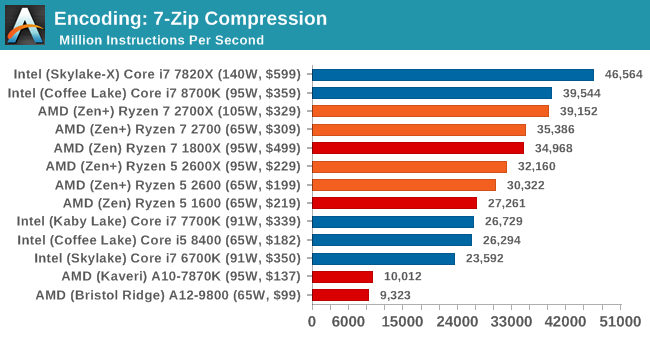
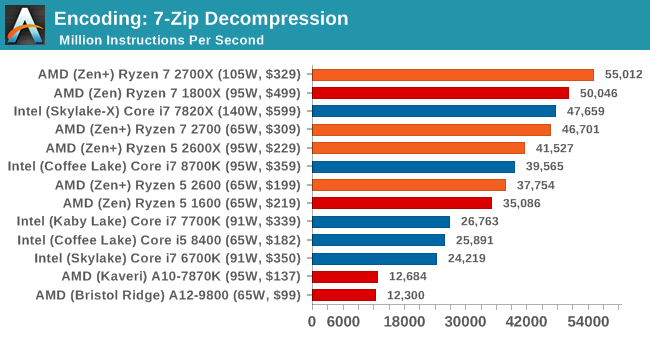
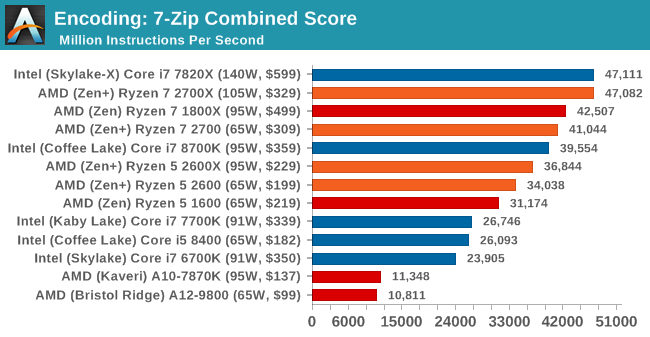
WinRAR 5.40: link
For the 2017 test suite, we move to the latest version of WinRAR in our compression test. WinRAR in some quarters is more user friendly that 7-Zip, hence its inclusion. Rather than use a benchmark mode as we did with 7-Zip, here we take a set of files representative of a generic stack (33 video files in 1.37 GB, 2834 smaller website files in 370 folders in 150 MB) of compressible and incompressible formats. The results shown are the time taken to encode the file. Due to DRAM caching, we run the test 10 times and take the average of the last five runs when the benchmark is in a steady state.
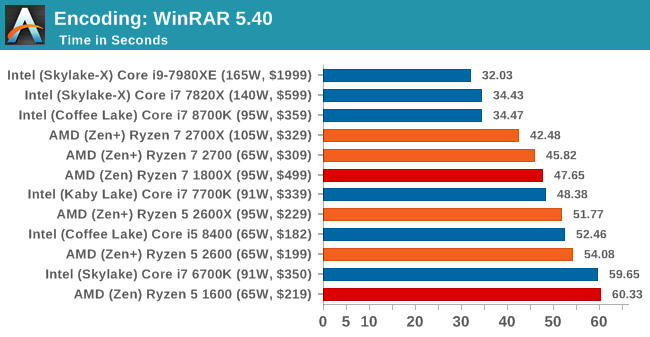
WinRAR requires a good memory base, so we see the quad-channel processors heading up the pack. The high IPC of the Core i7-8700K also does well.
AES Encoding
Algorithms using AES coding have spread far and wide as a ubiquitous tool for encryption. Again, this is another CPU limited test, and modern CPUs have special AES pathways to accelerate their performance. We often see scaling in both frequency and cores with this benchmark. We use the latest version of TrueCrypt and run its benchmark mode over 1GB of in-DRAM data. Results shown are the GB/s average of encryption and decryption.
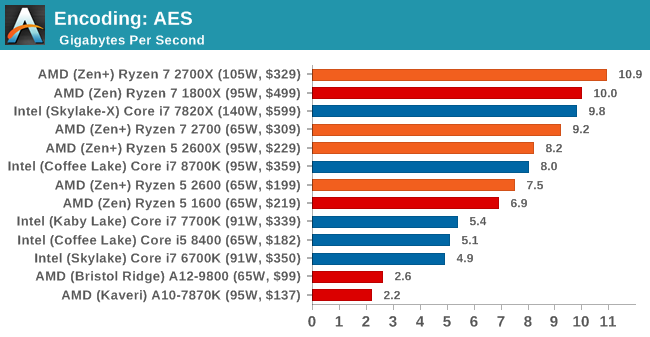
HandBrake v1.0.2 H264 and HEVC: link
As mentioned above, video transcoding (both encode and decode) is a hot topic in performance metrics as more and more content is being created. First consideration is the standard in which the video is encoded, which can be lossless or lossy, trade performance for file-size, trade quality for file-size, or all of the above can increase encoding rates to help accelerate decoding rates. Alongside Google's favorite codec, VP9, there are two others that are taking hold: H264, the older codec, is practically everywhere and is designed to be optimized for 1080p video, and HEVC (or H265) that is aimed to provide the same quality as H264 but at a lower file-size (or better quality for the same size). HEVC is important as 4K is streamed over the air, meaning less bits need to be transferred for the same quality content.
Handbrake is a favored tool for transcoding, and so our test regime takes care of three areas.
Low Quality/Resolution H264: Here we transcode a 640x266 H264 rip of a 2 hour film, and change the encoding from Main profile to High profile, using the very-fast preset.
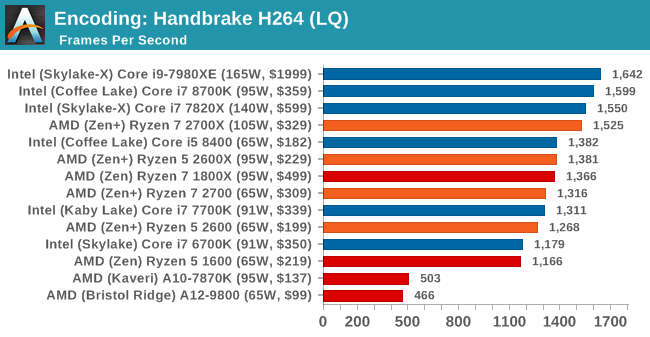
High Quality/Resolution H264: A similar test, but this time we take a ten-minute double 4K (3840x4320) file running at 60 Hz and transcode from Main to High, using the very-fast preset.
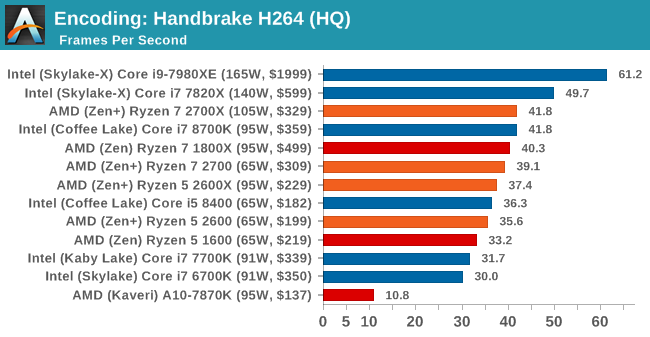
HEVC Test: Using the same video in HQ, we change the resolution and codec of the original video from 4K60 in H264 into 4K60 HEVC.
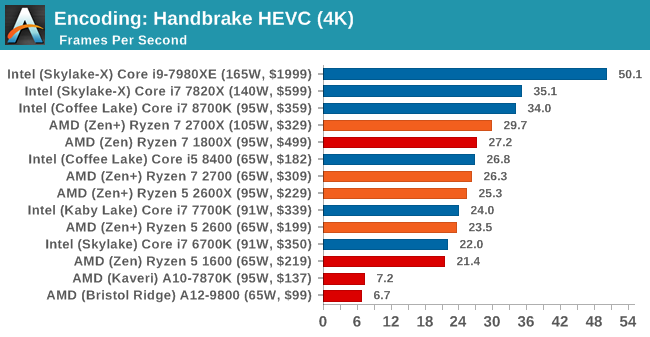
For HandBrake video encoding of large frames, there is a bump with the new Ryzen-2000 series processors over the previous generation, however there is still a gap up to the Core i7-8700K. The Core i5-8400 puts in a good showing here, above all but the best Ryzen parts.










545 Comments
View All Comments
John_M - Monday, April 23, 2018 - link
What edition of Windows 10 to typical gamers use and why?johnsmith222 - Monday, April 23, 2018 - link
In the meantime we have a lot benches to analyse :)Sum of web benches:
https://www.3dcenter.org/news/ryzen-2000-launchrev...
oRAirwolf - Monday, April 23, 2018 - link
I would really like to see some storage bench mark to compare pre and post Spectre/Meltdown patching of Intel CPUs as well as an apples-to-apples comparison of nvme storage performance compared to an Intel 8700k.Silma - Monday, April 23, 2018 - link
It's really hard to generalize on why people purchase the processors they do.I met a guy online with an over the top, super expensive computer. His sole purpose seems to be the first in the online tests and he will spend hours fine tuning the overclocking and whatnot.
Another guy mostly playing D3 purchased a 3K euro computer, which is absolutely over the top for what he plays/does. His reasoning is, I change my computer every 10 years, so when i do, I want the best components.
In my opinion, for most people without special needs (YouTube encoding, 3D rendering and whatnot), most processors have been good enough for years, and there is no reason to invest a lot in a processor when money is much better spent in an x4 PCIe SSD where you'll instantly feel the difference vs a hard drive or a medium quality SSD.
To me, power consumption and noise of processor as well as graphic card is a consideration at least as important as price.
The sole reason I would change processor today would be to get a fully Thunderbolt 3 compatible system, since the first TB3 audio interfaces are slowly coming to market.
Then again, I'm sure many people will have other priorities and reasons for purchasing their processors.
Targon - Monday, April 23, 2018 - link
Many of these high end systems are overpriced, or they come with components that are not worth it for what is being done. With that being said, going for a higher end CPU does make sense for those looking to keep their systems for a long time. Video cards and storage are areas that people should pay close attention to when it comes to price.NVMe drives are VERY expensive if you go up to the 1TB level, so spending that sort of money doesn't make sense when the prices will drop in the next two years. A 250-500GB NVMe drive would make more sense when combined with a traditional hard drive for additional storage. Video cards are also at a premium right now, as is RAM. If the system were purchased back in April of 2017, then yea, not too horrible to go for 32GB of RAM back then, but now, I'd stick with 16GB of RAM due to the prices being so much higher than they were.
For desktops, Thunderbolt isn't all that amazing when you can add a video or sound card to the system that will do what you want it to. Laptops are another story, and you need to pick and choose your priorities.
Flying Aardvark - Monday, April 23, 2018 - link
That's if you're short on money. I don't spend much extra other than vacations & eating very well. So when I upgrade, which is every 5 to 10 years, I buy the best available like Silma. I have a 1TB 960 Pro for that reason, it was $650 and I didn't think twice about it. I need the most reliable, fastest drive at the time. The 960 Pro is a MLC memory configuration, I've always used higher end MLC drives and they've served me very well.I'm not waiting a year or two, when I have over $100,000 sitting in my bank account doing nothing. What's the point, it's just $650. Same goes for the rest of my computer, which I only own/maintain one of.
Not everyone is a child or someone who doesn't spend the majority of their time progressing their careers so they can make more money. The price consideration is not the end-all, ultimate rule on hardware for every single consumer.
mapesdhs - Monday, April 23, 2018 - link
Indeed, though I guarantee some here will react poorly at the notion of someone who can make such a purchasing decision. :) Sometimes the best makes perfect sense, and if one can afford it, then why not.Kaihekoa - Monday, April 23, 2018 - link
Why are Anand's gaming numbers showing the 2700X beating all Intel CPUs when every other reviewer still shows the 8700K/7700K still being the best gaming CPUs?Flying Aardvark - Monday, April 23, 2018 - link
TechRadar & the wccftech preview has the same results. If you have been following Spectre as I have, you would've seen even users find this result. See the top comments here. https://np.reddit.com/r/pcmasterrace/comments/7obo...AT, TR & WCCF's results are accurate. Many reasons for this.
- Many reviewers used the old Ryzen balanced power setting which cripples the 2700X
- Disallowed the motherboard settings that push the chip over TDP
- Fully patched as possible for Spectre v1 & v2, which cripples Intel up to 50% in IO heavy tasks (streaming textures for games that do so).
There is naturally, lots of resistance to the fact that AMD is dominating. It's over for now, time for people to just admit it, they got screwed if they don't have Ryzen. Or at least, bought the inferior product.
mapesdhs - Monday, April 23, 2018 - link
I don't think those posting so much venom about the results will change their minds until AMD releases something that really is just right out the gate blatantly faster, including for IPC. Another year or two and I think that will happen.